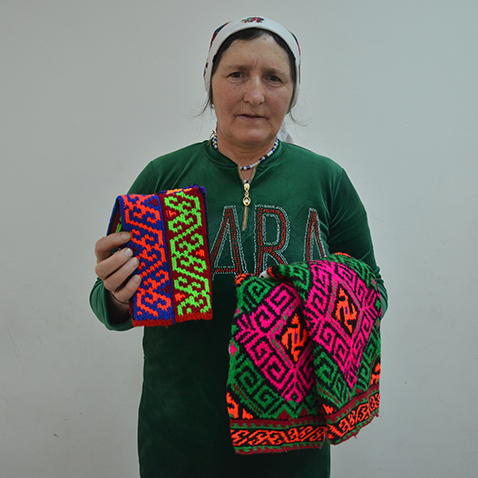Niyozbegim, a 58-year-old woman, has lived in Roshorv village of Rushan in Tajikistan’s Badakhshon region her entire life.
Rushan is located in the Bartang Valley, one the most remote and underserved areas of Tajikistan, where most residents are elders who spend their days farming and tending livestock yet barely make ends meet. Because of a lack of local job opportunities, young people have left the area to find jobs in larger cities like Khorugh and Dushanbe, or have left Tajikistan to find work in Russia. Most of the households remaining in Rushan rely on remittances from family members working elsewhere.

Niyozbegim married right after graduating from secondary school and soon had seven children. Because her mother and grandmother were masters at knitting and sewing, Niyozbegim learned early to knit Pamiri jurabs (socks) and toqis (skullcaps). But her days were filled with the chores of survival.
For most of that time, Niyozbegim and her family lived without electricity. In summer, she and the other women collected firewood from remote pastures and forests and brought it back by donkey. For some women, that meant walking 35 kilometers. Others had to spend more than TJS 3,000 ($265) on firewood from the market for a season, a sum much of the population could not afford. Often, the firewood reserves were not enough to endure the cold, long winter, sometimes lasting up to six months. Years of tree-cutting had also led to deforestation and desertification.
In 2020, Niyozbegim’s and the rest of the villagers lives changed when the Thrive Tajikistan: Partnership for Socio-Economic Development program, funded jointly by the Aga Khan Foundation and United States Agency for International Development (USAID), completed the construction of a 450-kilowatt hydropower plant in her village. The construction was led by Pamir Energy, a utility company founded in 2002 based on a public-private partnership concession agreement between the Government of Tajikistan and the Aga Khan Fund for Economic Development (AKFED).
After 18 years of darkness, this 450-kilowatt hydropower plant brought clean, reliable, and affordable electricity—for the first time in almost two decades—to over 2,000 people in the Bartang Valley.
“The supply of electricity changed my life and the life of Roshorv residents, I would say, extraordinarily, both in terms of social and economic aspects,” says Niyozbegim.
New Opportunities and Enterprises
Now with access to electricity, people of the region have new opportunities for education and new enterprises. Niyozbegim and her husband run a small sewing workshop, which yields income that helps her to meet her family expenses and to re-invest in the business. She hopes that her daughter, who is currently in Russia, will come back so they can work together.
Niyozbegim no longer needs to travel long distances to collect firewood for cooking. She has more time to run her business and even enjoy some leisure activities.
Her neighbor, 40 year-old Imomyor, a carpenter, no longer has to use an expensive diesel generator to power his machines, making his products more affordable. Imomyor now pays a fraction of what he used to pay for everyday energy needs. “Now, after construction [of the hydropower plant], I have clients from 11 villages of upper areas of Bartang Valley. I took another loan in the amount of TJS 16,000 ($1,416) from the micro-lending organization, Rushdi Kuhiston, to purchase a bigger carpentry machine. Currently, I am providing a job to my neighbor to assist me during the season.”
Access to electricity has a documented long-term impact on education and household income. According to the World Bank, having electricity in the household increases average employment and income by 25 and 30 percent, respectively. Hydropower energy can also help reduce deforestation and carbon emissions as well as smoke-related illnesses.